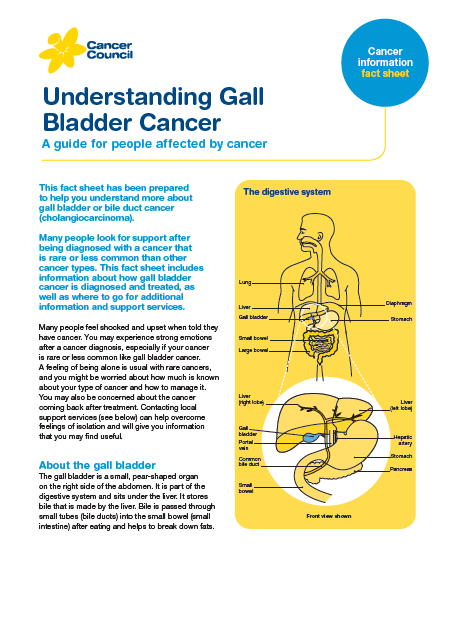- Home
- Gall bladder cancer
- About gall bladder cancer
About gall bladder cancer
In this section we look at gall bladder cancer, how it is diagnosed and treated, as well as where to go for additional information and support services.
Learn more about:
Overview
Many people feel shocked and upset when told they have cancer. You may experience strong emotions after a cancer diagnosis, especially if your cancer is rare or less common like gall bladder cancer.
A feeling of being alone is usual with rare cancers, and you might be worried about how much is known about your type of cancer and how to manage it.
You may also be concerned about the cancer coming back after treatment. Contacting local support services can help overcome feelings of isolation and will give you information that you may find useful.
About the gall bladder
The gall bladder is a small, pear-shaped organ on the right side of the abdomen. It is part of the digestive system and sits under the liver. It stores bile that is made by the liver. Bile is passed through small tubes (bile ducts) into the small bowel (small intestine) after eating and helps to break down fats.

What is it?
Gall bladder cancer occurs when cells in the gall bladder become abnormal and keep growing to form a mass or lump called a tumour. The tumour type is defined by the particular cells that are affected.
The most common type is adenocarcinoma, which starts in epithelial cells (which release mucus) that line the inside of the gall bladder. These make up about 85% of all gall bladder cancers.
Other types of gall bladder cancer include:
- squamous cell carcinoma, from squamous cells (skin-like cells)
- sarcoma, from connective tissue (which support and connect all the organs and structures of the body)
- lymphoma, from lymph tissue (part of the immune system which protects the body).
Malignant (cancerous) tumours have the potential to spread to other parts of the body through the blood stream or lymph vessels and form another tumour deposit at a new site. This new tumour is known as secondary cancer or metastasis.
Who gets it?
Gall bladder cancer is rare. About 382 Australians are diagnosed each year with gall bladder cancer. It is more likely to be diagnosed in women than men, and people aged over 65 years.
What causes it?
The cause of gall bladder cancer is not known in most cases, but risk factors can include:
- having had gallstones or inflammation of the gall bladder (although the majority of people with gallstones will never develop gall bladder cancer)
- family history of gall bladder cancer can result in a small increase in risk (first-degree relative such as mother, father, sibling or child). The majority of people with gall bladder cancer, however, will not have a family history
- other gall bladder and bile duct conditions and abnormalities, such as gall bladder polyps, choledochal cysts (bile-filled cysts) and calcified gall bladder (also known as porcelain gall bladder).
→ READ MORE: Gall bladder symptoms
Podcast for people affected by cancer
Listen now
Kathleen Boys, Consumer; Dr Julian Choi, HPB Surgeon, Western Health and Epworth Hospital, Vic; David Fry, Consumer; Dr Robert Gandy, Hepatobiliary Surgeon, Prince of Wales Hospital, Randwick, NSW; Yvonne King 13 11 20 Consultant, Cancer Council NSW; Elizabeth Lynch, Consumer; Dr Jenny Shannon, Medical Oncologist, Nepean Hospital Cancer Centre, NSW.
View the Cancer Council NSW editorial policy.
